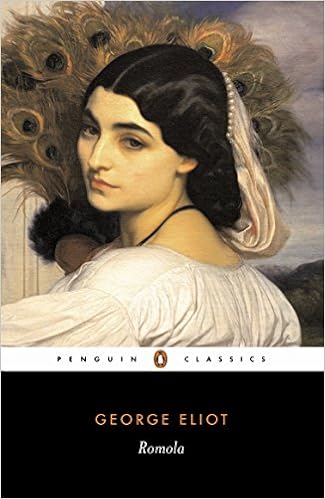My wife and I just started watching Netflix's Wild Wild Country, a docuseries about Baghwan Shree Rajneesh, who transplanted his utopian ashram from India to Oregon in the 1980's, leading to a catastrophic conflict with local Oregonians. The charismatic Baghwan put into my mind the figure of medieval Florentine monk Fra Girolamo Savonarola as interpreted by George Eliot in the historical novel Romola: Both are charismatic religious leaders, whose message is one of a special dispensation for the time and place in which they live. The world will be changed, they argue, but it will begin to be changed here and now, through us. And both ended up embracing the ordinary dirtiness of politics they wanted to believe themselves apart from.
If you know about Savonarola, you probably associate his name with the bonfire of the vanities--enormous literal bonfires of things thought to distract from a holy life, like jewelry, fancy clothes, and proscribed books. It's hard today to imagine how a guy like that amassed such a huge following. He sounds like such a prude! But Eliot does a great job of showing how such attitudes might sweep through an entire city, and entire culture, not just because of their Puritan repressiveness but because they offered a glimpse of a new social order in which the poor and the mighty are equal.
Against this backdrop Eliot tells the story of Tito Melema, a learned Greek who arrives in Florence after a shipwreck. Tito becomes an assistant to a blind scholar named Bardo Bardi, and falls in love with his daughter Romola. Bardo is reminiscent of Casaubon from Middlemarch--a determined scholar whose prime worry is that he will die before his great work is complete. (In fact, the level of historical detail of Romola shows Eliot herself to be a little Casaubon-like, I think.) But Bardo is kind, rather than selfish, and Tito's devotion to him has a great effect on Romola. When they marry, she has no idea that he has another wife, the peasant Tessa, whom he's married in a mock "ceremony" during a festival (she doesn't understand it was a farce--it's complicated), and with whom he'll end up having several children. Nor does she know that he has decided not to go looking for his father Baldassare, shipwrecked and enslaved by Turks.
Tito's character arc is well-done. He begins as a charming protagonist but becomes a thoroughgoing villain. Tito becomes a bad guy for the simplest of reasons: he doesn't want to give up his comfort. He doesn't want to search for Baldassare because he'd rather sell the jewels he might use for ransom, and live in comfort with Romola. He has two wives because he just likes them both. He knows his love for Romola is more profound, but man, Tessa sure is nice to be around. Eliot gets to a sad truth: some of the worst things we do are for the dumbest, most self-serving reasons:
Under every guilty secret there is a hidden brood of guilty wishes, whose unwholesome infecting life is cherished by the darkness. The contaminating effect of deeds often lies less in the commission than in the consequent adjustment of our desires--the enlistment of our self-interest on the side of falsity; as, on the other hand, the purifying influence of public confession springs from the fact, that by it the hope in lies is forever swept away, and the soul recovers the noble attitude of simplicity.
Of course, this being a Victorian novel, you would expect Baldassare to end up in Florence, and he does, looking for revenge. This offers Tito the opportunity to dig his moral hole deeper, to reject his own father and drive him to madness. Later he becomes embroiled in the political affairs of Florence, perfecting a self-serving strategy of double-dealing, allying with the Mediceans against the forces of Savonarola, and vice versa.
It takes the novel a long time to get around to the title character of Romola. She doesn't seem present or real until Tito's perfidy is already very clear to her, and to us. Her moral arc is predicated on her unhappy marriage. Trying to flee the city, she runs into Savonarola, who convinces her to return and accept the burden of the marriage vows she's made. She becomes one of the monk's acolytes, and begins to devote her life to helping the needy. As Savonarola's influence wanes and his own flaws become clear, she begins to reflect on the difficult question represented in the passage I quoted at top: when is it right to obey and when is it right to rebel? In a dreamlike passage, she lies down in a boat and floats away from Florence, only to find herself in a village decimated by the plague, which she helps to nurse back to life. (Again, the parallels with Middlemarch abound--like Dorothea Brooke, Romola also turns to selflessness to cope with a failed marriage.)
Romola is a long novel. It's about 700 pages. It's full of compelling characters: Tito and Romola especially, but also Baldo and Baldassare, and several strong supporting characters. Niccolo Machiavelli is here, in addition to Savonarola, and several other real-life figures from late 15th-century Florence. To be honest, most of the politicking went over my head. Eliot clearly has a deep and intricate understanding of the political scene in this place and time, and punctuates the main narrative with a lot of conversation between common folks about what's going on with the Medici and the devotees and Savonarola and all of that. I gave into the urge to skim through a lot of it, in order to get to the stuff with Tito and Romola. But you can't say that Romola doesn't give a sense of life to the 15th century, or make a strange relic like Savonarola a little easier to understand.


No comments:
Post a Comment